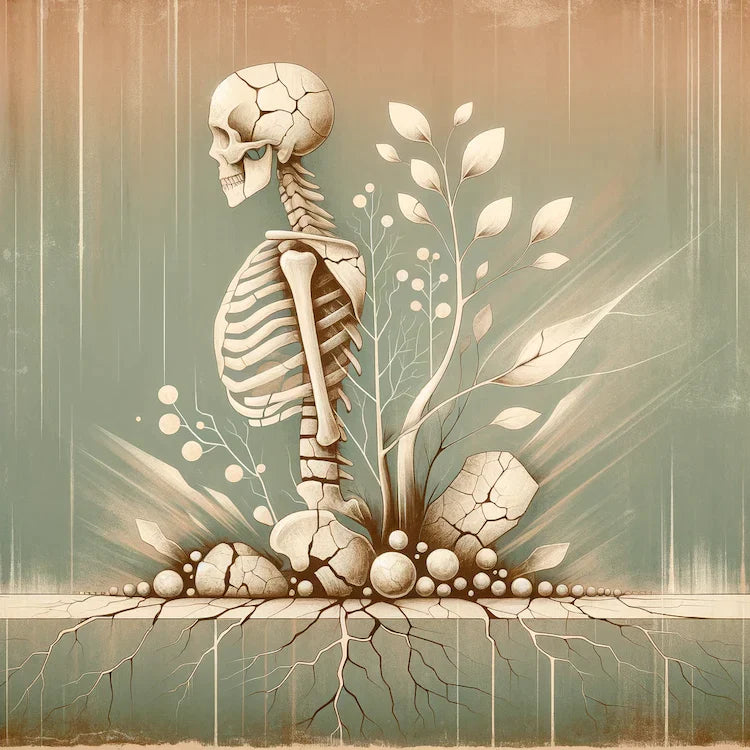CALCIUM: THE ESSENTIAL BUILDING BLOCK FOR BONE HEALTH AND WELL-BEING
According to the NIH, calcium is an important mineral for the human body. It plays a vital role in maintaining our overall health and well-being. It is best known for its role in bone health, but its effects go far beyond this, influencing muscle function, nerve signalling and blood clotting. The NIH also notes that calcium intake, in combination with physical activity and vitamin D, influences the development of osteoporosis.
Calcium is the most abundant mineral in the human body and is found mainly in bones and teeth. It is essential for maintaining the structural integrity of bones and teeth, making it a crucial element from infancy to old age.

WHAT FOODS ARE RICH IN CALCIUM?
Calcium is found in a wide variety of foods, with dairy products such as cheese, yoghurt and milk being some of the best-known sources of calcium.
Plant sources such as green leafy vegetables: some varieties such as kale, broccoli, fennel and pak choi are particularly rich in calcium.
Calcium-enriched foods: Many plant-based dairy alternatives (such as almond, soya and oat milks), as well as some fruit juices and tofu varieties, are often fortified with calcium.
Nuts and seeds: Almonds, chia seeds, sesame seeds and tahini (sesame paste) are good sources of calcium.
Legumes: Beans, lentils and chickpeas also contain calcium.
Nuts: Dried figs, in particular, are a good source of calcium.
Amaranth and quinoa: These pseudocereals contain more calcium than most cereals.
Seaweed: Some types of seaweed, such as wakame and kombu, also contain calcium.
It is important to include a variety of these foods in your diet to ensure that your body is getting enough calcium. It is also advisable to ensure an adequate intake of vitamin D, as this vitamin is necessary for the effective absorption of calcium in the body.

HOW to detect a calcium deficiency?
If the body does not receive enough calcium, several symptoms and signs that are often overlooked can appear.
One of the first signs of a calcium deficiency is a general tiredness or weakness that persists even with adequate sleep.
In addition, muscle cramps, especially in the legs and feet at night, can indicate insufficient calcium intake early. A persistent deficiency can lead to brittle nails, dry skin, and an increased tendency to
bone fractures, as calcium plays a crucial role in bone strength.
Neurological symptoms such as numbness or tingling in fingers and toes and memory problems may also occur.
These symptoms are often subtle and develop gradually, so it is important to pay attention to diet and consult a doctor if necessary to recognise and treat a calcium deficiency at an early stage.

What happens if I consume too much calcium?
Excessive calcium intake can cause several health problems that are often underestimated.
Hypercalcaemia occurs when the level of calcium in the blood exceeds normal values. This can cause symptoms such as nausea, vomiting, increased thirst and frequent urination. In severe cases, it can lead to confusion, lethargy and even cardiac arrhythmia. In the long term, excessive calcium intake can lead to kidney stones, as the body excretes excess calcium through the kidneys.
Therefore, it is important to keep calcium intake within the recommended daily allowance and exercise caution when taking supplements, especially if you already consume calcium-rich foods. If in doubt, always consult a nutritionist or doctor to clarify your individual needs.

How much calcium should one consume daily?
The recommended daily calcium intake varies according to age, gender and individual health conditions.
A maximum daily intake of 500 mg through food supplements is recommended.

NASSIM JAMALZADEH:
"Calcium plays a crucial role, especially in bone function. Especially during intense physical activity, it is advisable to supplement with magnesium and calcium to maintain muscle function and support regeneration processes.
In addition, a calcium deficiency is also associated with brittle nails, dry skin, fatigue and physical weakness."
FAQs about calcium
FAQs about calcium
Yes, you can take calcium during pregnancy. However, you should consult your doctor before taking it.
Our gummy bears have been developed for adults, so we can only make a recommendation for adults. In principle, children can also take our calcium. However, we recommend that you talk to your doctor before taking them.















